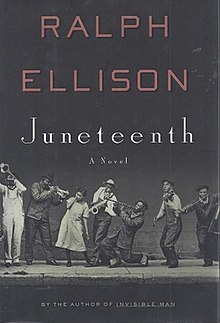Juneteenth (novel)
 | |
| Author | Ralph Ellison |
|---|---|
| Country | United States |
| Language | English |
| Genre | African-American literature |
| Publisher | Random House |
Publication date | 1999 |
| Media type | Print (Hardcover and Paperback) |
| Pages | 368 |
| ISBN | 0-394-46457-5 |
Juneteenth is Ralph Ellison's second novel, published posthumously in 1999 as a 368-page condensation of over 2,000 pages written by him over a period of 40 years.[1] It was originally written without any real organization, and Ellison's longtime friend, biographer and critic John F. Callahan, put the novel together, editing it in the way he thought Ellison would want it to be written.
The fuller version of the manuscript was published as Three Days Before the Shooting... on February 2, 2010.
History[]
Ellison began work on his second novel around 1954, following the publication of Invisible Man.[2]
Ellison claimed to be devastated when part of the original manuscript of Juneteenth was destroyed by a fire in 1967. However, Arnold Rampersad advanced the opinion that the loss of the crucial, irrecoverable sections of his manuscript appears to have been something Ellison concocted after the fact to justify his lack of progress. In his 2007 biography of Ellison, Rampersad points out that, following the fire, Ellison wrote to critic Nathan Scott of his relief that he still "fortunately had a full copy" of all his writing.[1][3][4] In different interviews, the lost manuscript pages were described as "360 pages, and "500 pages", and "about a summer’s worth of revisions".[2]
Ellison published eight excerpts from the novel during his lifetime,[5] including an excerpt called "Juneteenth" in the Quarterly Review of Literature in 1965,[2] and the story "Cadillac Flambé", published in American Review in 1973 and reprinted many times since,[6] which received considerable critical attention,[5][7] leading to a lot of interest in the unpublished work. However, although he had written over 2,000 pages by the time of his death, Ellison never finished the novel.[5]
Publication[]
Following Ellison's death, John F. Callahan, named Ellison's literary executor by his widow,[5] was pressed to release the novel, despite the fact that the pages of manuscript were not organized and Ellison had left no notes on how they were to be put together. For this work, Callahan took the central episode from Ellison's manuscripts, and delivered as a single work,[8] with a promise that the full version would be made available at a later time.[5]
Reviews[]
The long-awaited novel received mixed reviews. The review in The Guardian said that although the work was published with the subtitle "a novel," it "is decidedly not a novel: it lacks a novel's shape, rationale, and self-justifying propulsion."[8] Publishers Weekly acknowledged Callahan's "difficulties" in putting the novel together from Ellison's incomplete manuscript, but concluded "this volume is a visionary tour de force, a lyrical, necessary contribution to America's perennial racial dialogue, and a novel powerfully reinforcing Ellison's place in literary history."[9] Scott Saul in Boston Review states "The book is more than Ellison fans could expect, yet less than Ellison probably hoped--an ambivalent masterpiece."[10]
Longer Version[]
A fuller version of the manuscript was published as Three Days Before the Shooting... on February 2, 2010.
See also[]
References[]
- ^ Jump up to: a b Ellison, Ralph & Callahan, John F. (Introduction and Afterword describing the writing and editing process) (1999). Juneteenth. New York: Random House.CS1 maint: multiple names: authors list (link)
- ^ Jump up to: a b c Pruitt, Sarah (June 19, 2017). "Why Ralph Ellison Never Published a Second Novel During His Lifetime," History. Retrieved June 20, 2020.
- ^ Johnson, Loretta (Spring 2004). "History in Ellison's Juneteenth". Studies in American Fiction. 32 (1). pp. 81–99.
- ^ Marcus, James (1999). "Editorial Reviews: Juneteenth". Retrieved June 20, 2019.
- ^ Jump up to: a b c d e Feeley, Gregory (May 23, 1999). "Invisible Hand", The New York Times Magazine. Retrieved June 20, 2020.
- ^ Ellison, Ralph (Spring 1995). "Cadillac Flambé", Callaloo, Vol. 18, No. 2. (Reprint in Callaloo Vol. 24, No 2, Spring 2001). Retrieved June 20, 2020.
- ^ Myers, Margaret, and Dean, Sharon (2007). "Cadillac Flambé": Race and Brand Identity", Charm. Retrieved June 20, 2020.
- ^ Jump up to: a b Wood, James (1999). "Son of a preacher man", The Guardian. Retrieved June 20, 2020.
- ^ "Review: Juneteenth". Publishers Weekly. Reed Business Information, Inc. Retrieved June 20, 2020.
- ^ Saul, Scott (June 1, 1999). "Review: Juneteenth By Ralph Ellison," Boston Review. Retrieved June 20, 2020.
External links[]
- Callahan, John F. (June 30, 1999). "Presentation on Juneteenth". C-SPAN.
- 1999 American novels
- Unfinished novels
- Novels by Ralph Ellison
- Novels published posthumously
- Random House books
- Juneteenth
- African-American novels